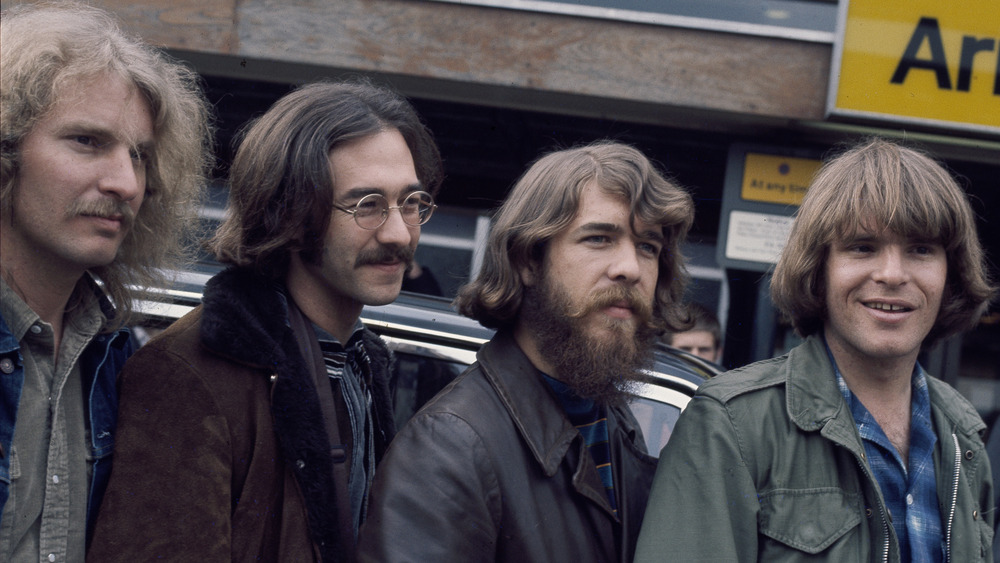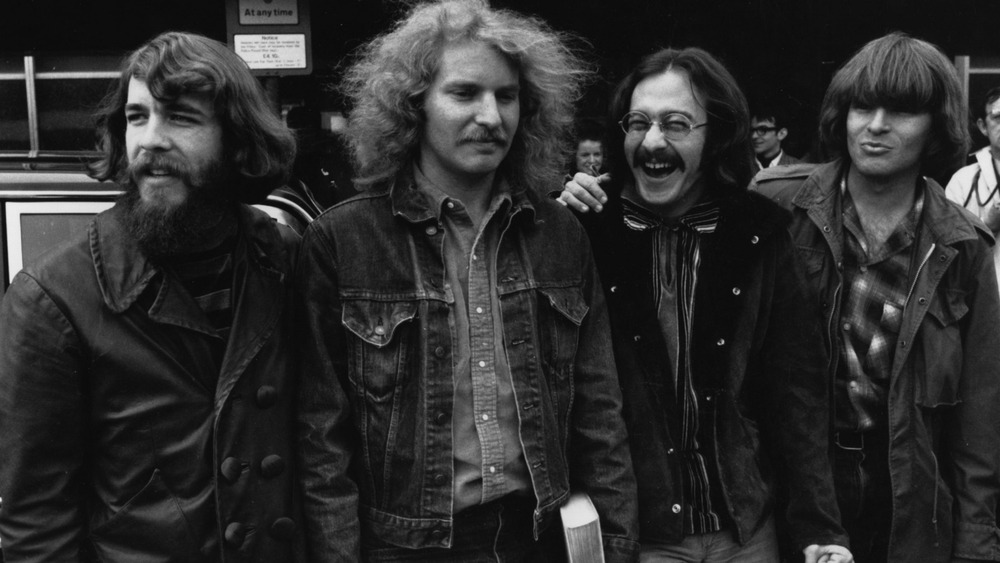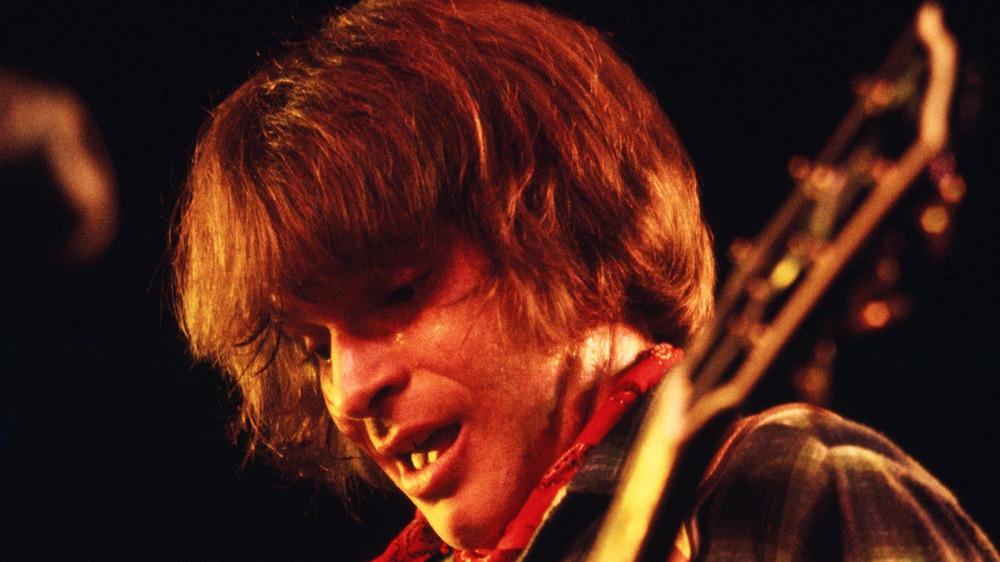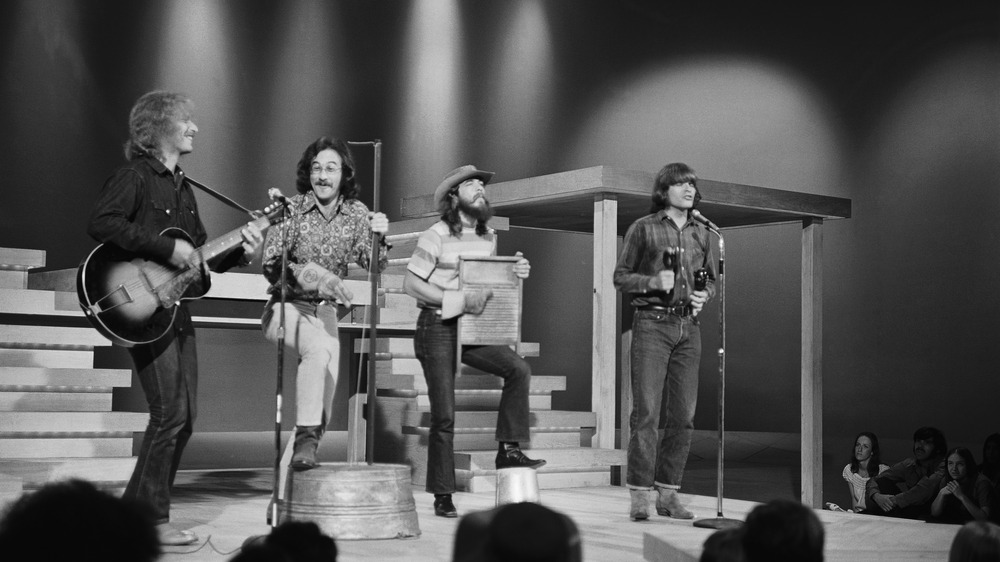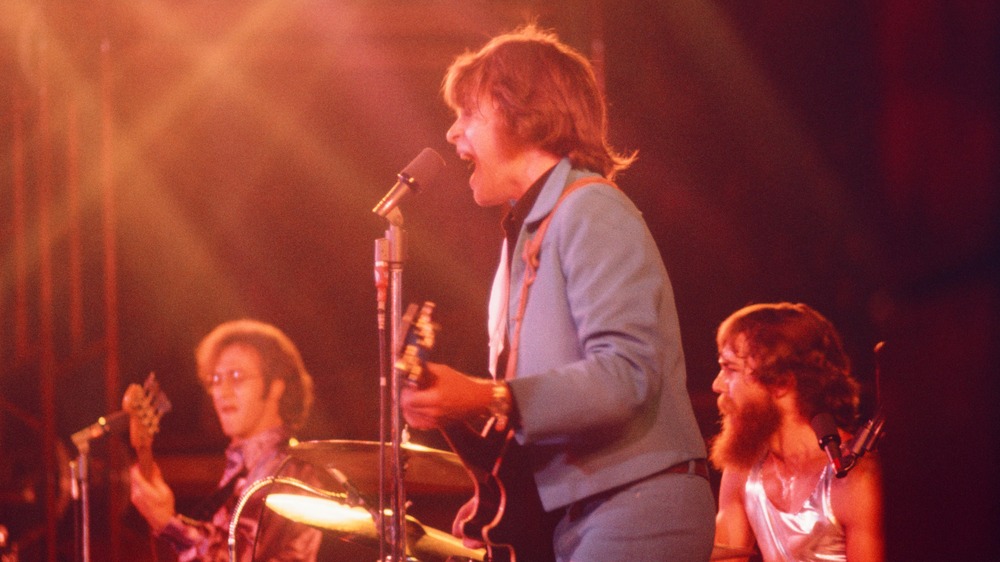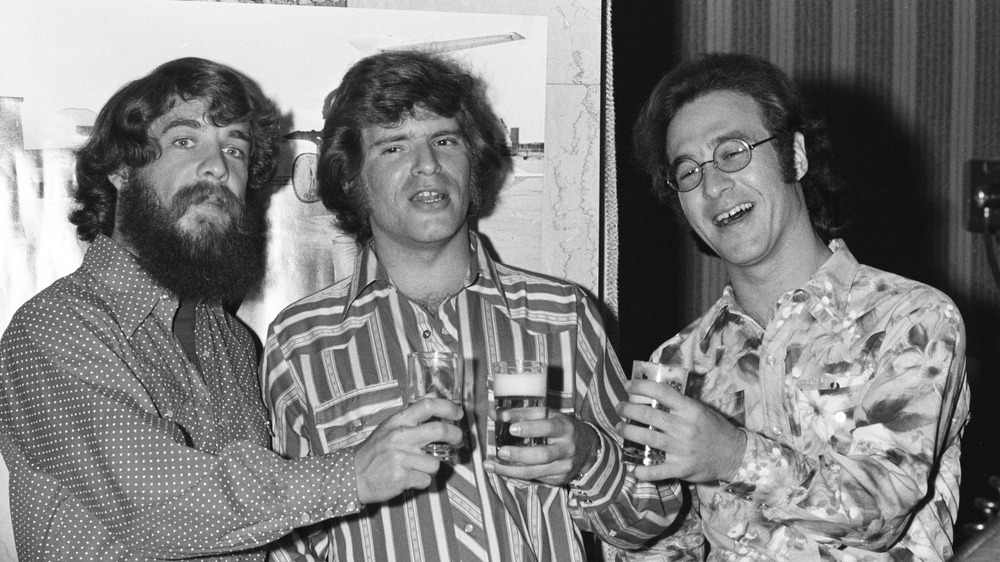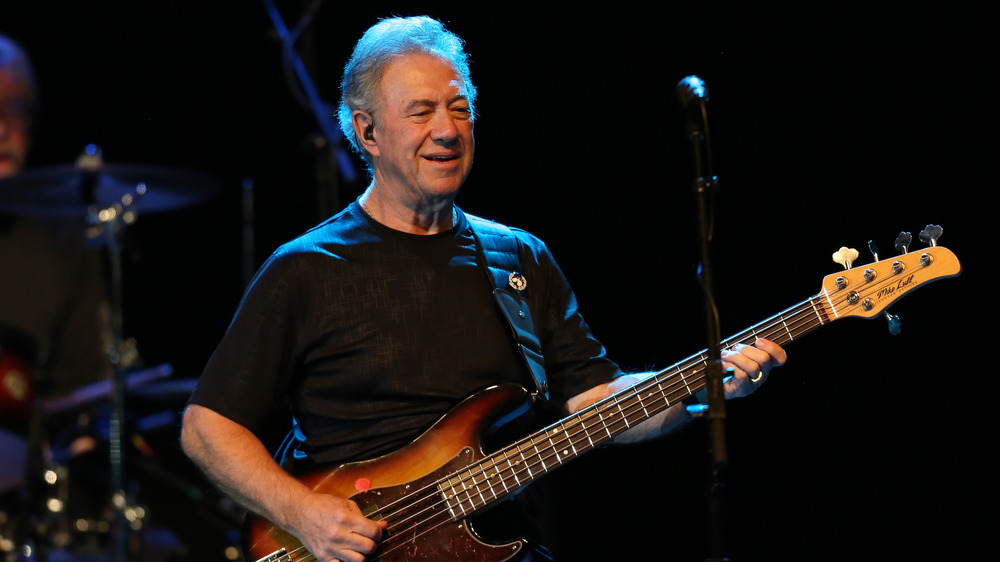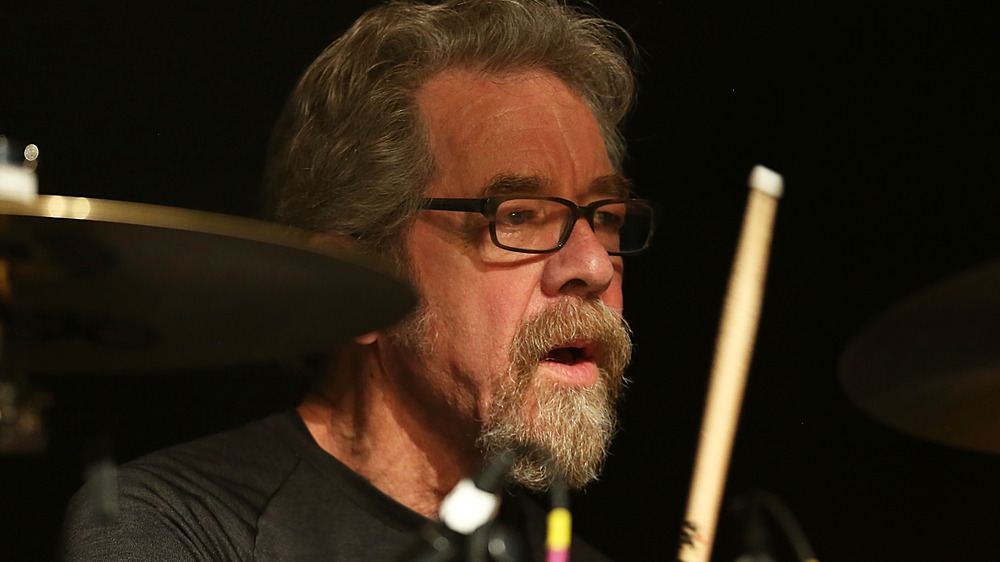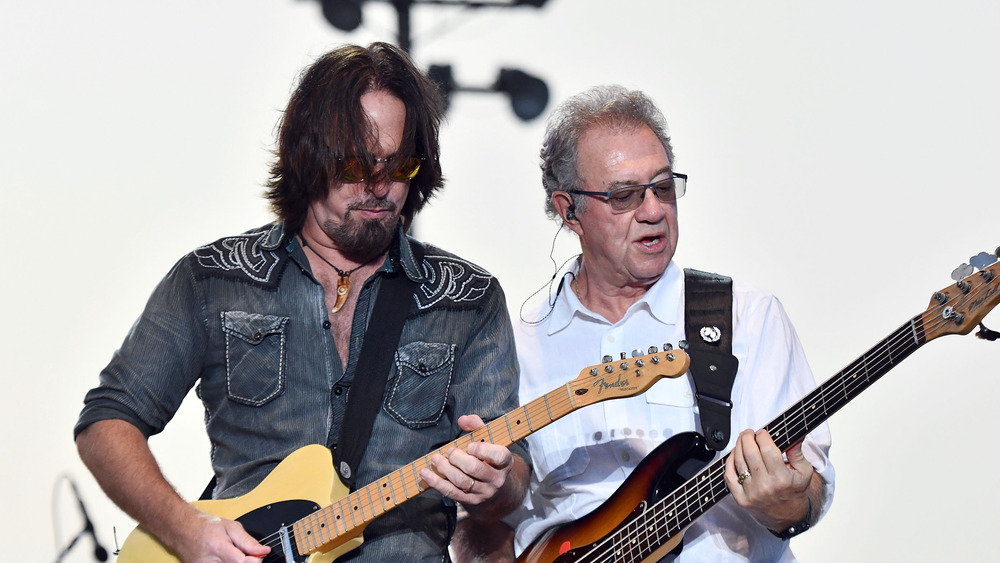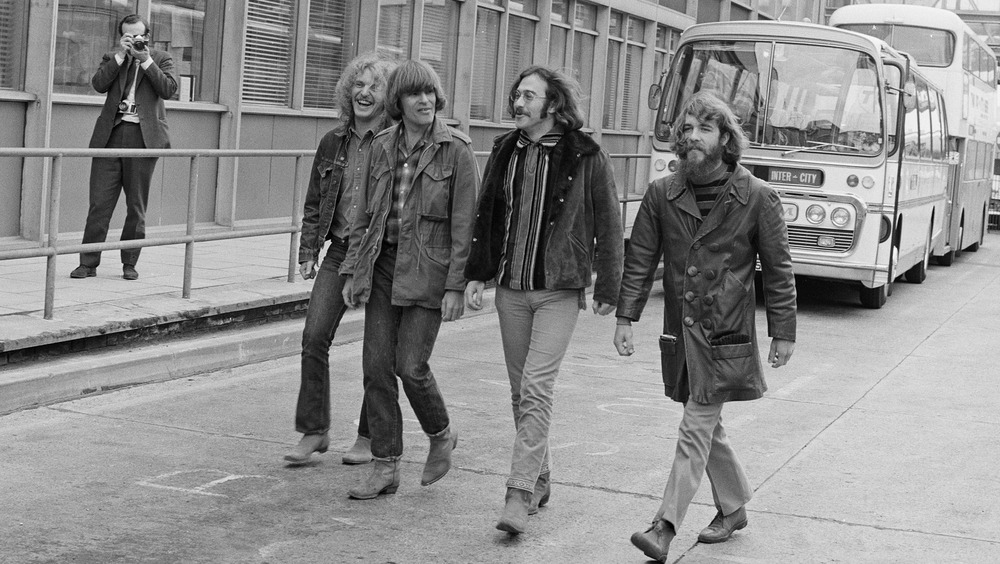The Creedence Clearwater Revival Breakup Timeline Explained
The short-lived rock band Creedence Clearwater Revival got its start in a junior high school band room in El Cerrito, California. According to Louder Sound, drummer Doug "Cosmo" Clifford still remembers going up to John Fogerty, who was playing piano at the time, and telling him he was a good musician. The two ended up starting a band at the age of 14.
Clifford's friend Stu Cook joined them — at first on piano and later on bass — and then John's older brother Tom joined in as well. They were young, but they had plans to sign with a real label. Fantasy Records, the small independent label the band was aiming for, was in Berkeley, not too far from El Cerrito, which is across the bay from San Francisco.
The rest, as they say, is history. Creedence Clearwater Revival, as they eventually came to be known, was a hit-making machine in their first few years of working as a band full-time. Despite being massively popular as a group, however, they were not as well-known as individual musicians. After Creedence Clearwater Revival broke up, John and Tom Fogerty both released solo albums, while Cook and Clifford later formed Creedence Clearwater Revisited. That said, the details of the band's breakup and the major feud that followed are the stuff of music legend. Let's try to straighten out the timeline of Creedence Clearwater Revival's chaotic split.
Creedence Clearwater Revival, eventually
After signing with Fantasy Records and its owner, Saul Zaentz, in 1964, the foursome went through a few name changes (the Blue Velvets to the Golliwogs to Creedence Clearwater Revival). They settled on Creedence Clearwater Revival, often abbreviated as CCR, which was named from a mix of things, according to Louder Sound: The first word was a friend's name, the second referenced a beer commercial, and the third word worked as a "statement of intent." The band had their first break with 1968's cover of Dale Hawkins' "Susie Q," which mainly spread by radio play.
From 1968 to 1972, Creedence Clearwater Revival was known for their rock music with a rhythm and blues sound. The musicians didn't mind the "swamp rock" label and were mainly amazed that fans were even coming up with labels for them at all. Keep in mind that these men weren't rock stars. They started a band with their friends and family members when they were teenagers. It took a lot of hard work, not to mention luck, to even get a small bit of success. It's no surprise the band was impressed with their fans.
CCR was composed of four musicians: singer John Fogerty, his brother Tom on rhythm guitar, bassist Stu Cook, and drummer Doug Clifford. John Fogerty was always concerned that if they weren't in the public eye, the public would forget them (via Uncut). As we can see now, that wasn't the case.
Singles stardom
Starting with 1968's "Susie Q", Creedence Clearwater Revival landed plenty of hit singles on their first six albums, all of which came out within three years, according to Ultimate Classic Rock. Some of their famous songs from this prolific stretch of years include "Who'll Stop the Rain" and "Down on the Corner."
Let's do a small comparison: Beyoncé, one of the most enduring artists of this century, released six studio albums from 2003 to 2016. That's a 13-year period, whereas Creedence released three of its albums within the same year. Few artists do that much work within 12 months. John Fogerty had a relentless work schedule while he was a member of Creedence Clearwater Revival, one he imposed upon himself as the band's principal songwriter, singer, and manager.
Creedence Clearwater Revival was originally influenced by British bands of the 1960s, such as the Beatles, Them, and the Yardbirds. When they found their own sound, John Fogerty became their main songwriter. He mostly avoided songs about women or romance, instead focusing on social issues such as the Vietnam War, according to Britannica. Meanwhile, CCR's hit "Proud Mary" was a fictional account of traveling the Mississippi River. John Fogerty is a gifted songwriter who was able to capture the late 1960s and early '70s in his music. His lyrics lasted despite their contemporary influence, as opposed to songs that would have fit into any time and place.
Tom Fogerty
Tom Fogerty was Creedence Clearwater Revival's rhythm guitarist. He was John Fogerty's older brother and joined after John had agreed to be in a band with Doug Clifford. Although he was the younger brother, John's star was destined to rise higher than Tom's
As a high school student, Tom was in a band called Spider Webb & the Insects, according to AllMusic. They signed with Del-Fi Records but didn't release anything before breaking up. Tom then joined with the Blue Velvets as their lead singer. When the band's name was changed to the Golliwogs, Tom became co-songwriter and co-vocalist with his brother John. Around that time, it also became clear that John was better at both singing and penning lyrics, so Tom stepped over to rhythm guitar. From there, CCR was born.
In 1971, Tom left the band over issues with creative control. He went on to a solo career, releasing albums throughout the 1970s, but only 1972's Tom Fogerty landed on the charts. Despite the friction between the Fogerty brothers, CCR managed to get it together long enough to play for Tom's wedding in 1980. Tom and John remained at odds, however, until the former died in 1990 of AIDS by way of pneumonia. An unscreened blood transfusion reportedly caused his infection.
Tom Fogerty died young, and it's interesting to contemplate what he might have been able to do with more time. He was a fairly accomplished vocalist and was also the first member of the band to realize that Creedence Clearwater Revival wasn't where his future lay.
CCR's members wanted more input
Prior to the band's last album, Mardi Gras, John Fogerty was Creedence Clearwater Revival's main songwriter. Around 1970, the other members of the band began asking him to have more input in CCR's business and creative decisions. Tom Fogerty, after quitting the band over this very issue in 1971, continuously complained in the following years that his contributions to the band had not been appreciated at the time, writes AllMusic.
This is where the story starts to splinter into pieces. According to Tom Fogerty, Stu Cook, and Doug Clifford, they asked John Fogerty for more creative control. As detailed by Ultimate Classic Rock and Uncut, according to Cook and Clifford, John told them that if they really wanted that, then for their upcoming album, they would write all the music and lyrics or he would leave the band. John said he would only play rhythm guitar on their compositions.
According to John Fogerty, the conversation went differently. It's worth noting here that these musicians had a rough falling out, and even now, 40 years later, it's impossible to really know who has the right of it. Regardless, writes Uncut, according to John, his bandmates said they'd leave if they didn't get more creative control on the next album. Said next album was titled Mardi Gras, and it would basically kill CCR's career.
The seventh album: Mardi Gras
Mardi Gras was CCR's seventh album. John Fogerty actually ended up writing three songs (contrary to what he had told his bandmates), Stu Cook wrote four, Doug Clifford penned three (one co-written with Cook), and the last was a cover of Ricky Nelson's "Hello Mary Lou." Rolling Stone critic Jon Landau wrote that, "The result is [...] the worst album I have ever heard from a major rock band." This, particularly since it was Creedence, was saying something. They had been a hit factory for so long that this statement by Rolling Stone, of all media outlets, was shocking.
Fogerty, writes Uncut, knew before it was released that the album wouldn't be well-received, though he says Cook and Clifford thought "it was really cool." According to Ultimate Classic Rock, although the album was successful, it didn't sell as well as previous CCR albums.
Mardi Gras ended Creedence Clearwater Revival's run. By that point, the once-quartet had become a trio, and after the differences of creative control the album brought to light, the bandmates didn't work well together. Their breakup would last for decades.
Creedence Clearwater Revival breaks up
The band announced their official breakup on October 16, 1972. It was just six months since Mardi Gras had been released, according to Ultimate Classic Rock. For an outsider looking in, this wasn't terribly surprising. Tom Fogerty had left a year prior, and the chaos of the album led to tempers flaring and incredibly hurt feelings all around. Creedence Clearwater Revival wouldn't play together for nearly decade — something had clearly broken internally along the way.
What makes it doubly a shame is that CCR was still at the forefront of the American rock scene in 1972. Everyone knew them, they had toured in the United States and Europe during the summer of 1971, and their first six albums had all been widely successful. But Mardi Gras just didn't hit the same high notes. Each band member wanted different things from their music (particularly Tom Fogerty), and it was time to move on.
John Fogerty
John Fogerty was Creedence Clearwater Revival's manager, songwriter, guitarist, and lead singer. He penned most of the band's songs, save for the majority of their last album, Mardi Gras. Fogerty had always had a fascination with the South, perhaps because it was the complete opposite from his childhood home of Northern California, writes Uncut. Therefore, when he started writing his own music, he turned to the Mississippi River and Louisiana.
After the band's breakup, Fogerty refused to play CCR's music for nearly a decade and a half. Of that time, he said in 2014, "I had so much anger, I was afraid that I'd start singing 'Proud Mary' and go off on a tirade. If one of my songs came on the car radio, I'd change the station." Fogerty continued on in a solo career but was also beset by lawsuits, particularly from Fantasy Records and its owner, Saul Zaentz, who had signed Creedence Clearwater Revival in the first place.
Fogerty released an album of covers in 1972, according to AllMusic, on which he played every instrument. The next year, he released a self-titled album and then went quiet for several years as issues with Fantasy Records and Zaentz played out. He is still a professional musician today and last released an album, Fogerty's Factory, in 2020. He did began to work in some form with Doug Clifford and Stu Cook again, this time on merchandising, as reported by ABC News.
Stu Cook
Stu Cook was Creedence Clearwater Revival's bassist. On Mardi Gras, he wrote and performed "Door to Door" and "Take It Like a Friend," among others. Cook helped nail down the genre of electric bass guitar, according to Creedence Revisited.
Cook worked on Creedence Clearwater Revisited with Doug Clifford (from 1995 forward) and was also a member of Southern Pacific, a country-rock group. He joined that band in 1986 on bass and background vocals, though the group broke up in 1991. They ultimately released four albums, according to AllMusic. Creedence Revisited writes that Cook and Clifford also worked with the Don Harrison Band, which ultimately released two albums.
Stu Cook hasn't had a solo career, unlike his former bandmates. According to The Quietus, Cook produced 15 songs for Roky Erickson and the Aliens in 1980, split across two LPs. The music is rock with a gothic edge, fitting for its discussions of Erickson's time in prison, his mental health issues, and when medication for the latter was pushed on him against his will.
Doug Cosmo Clifford
Doug Clifford was the drummer for Creedence Clearwater Revival. After the breakup, he continued to play with his bandmate Stu Cook in Creedence Clearwater Revisited, which they started in 1995, according to Creedence Revisited. They both retired in 2019. Clifford, however, has continued to release music, though what has come out so far are old recordings from the 1980s as opposed to new music.
Clifford released a solo album, the self-titled Cosmo, in September 1972 before joining bass player Stu Cook in the Don Harrison Band (via Drummerworld). The two continued to work together throughout their long careers. Clifford has had cancer treatments, according to Vermillion County First, and announced a diagnosis of Parkinson's disease in April 2020. "I could tell things were going to change, and I didn't want to be up there with the boys and Stu and have to walk or crawl off the stage," Clifford said.
It can be difficult for musicians who either need to keep touring for the money or are obligated to because of a contract. For the sake of his health, it's wonderful that Clifford was able to retire from touring, and for the sake of his being a musician, it's great that he's able to continue releasing music for fans to enjoy.
Further work and drama
In 1993, Creedence Clearwater Revival was inducted into the Rock and Roll Hall of Fame. However, John Fogerty didn't want to play with Doug Clifford and Stu Cook. He instead opted to perform with a large number of high-profile musicians, including Bruce Springsteen. Fogerty, whose solo career had been hamstrung by lawsuits involving Saul Zaentz and Fantasy Records, per Louder Sound, had learned that Cook and Clifford had sold certain rights to Zaentz, and he was angry. "It was humiliating," Cook told Uncut. "It was like John thought he was getting inducted, instead of Creedence. He thought he could exclude us."
Clifford and Cook continued their Creedence work with the creation of Creedence Clearwater Revisited, which played CCR's music live. They both retired in 2019 and ended Revisited. Clifford released his second solo album, Magic Window, in 2020. He put it together, according to KMUW, from songs recorded in the 1980s that he had kept all those years.
It is unclear — though unlikely — if Creedence Clearwater Revival will ever play together again. CCR has been through so much together that it's doubtful they will ever completely forget each other. However, the breakup caused plenty of bad feelings which could require more than just time to heal. Also, with Clifford and Cook's retirement from touring, that ship very well may have sailed.
Could there be a CCR reunion?
As unlikely as the possibility of a CCR reunion may seem, in 2014, John Fogerty actually hinted at the now-trio working together again, but Doug Clifford and Stu Cook weren't interested, writes Uncut. "It might have been a nice idea 20 years ago, but it's too late," Clifford said at the time. The group played together for the last time in 1983 for their high school reunion, using their original name of The Blue Velvets.
However, in recent years, tempers have cooled somewhat. As reported by The Arizona Republic, Doug Clifford and John Fogerty started business selling band merchandise. (ABC News reports that Cook is involved, as well.) "I wouldn't say it's a warm and fuzzy thing," Clifford said. "But I'm at the point in my life, I'm 75 years old and I've got a real great opportunity with 'Magic Window.' He's off playing with his kids now. We've been through a lot together. And I wish him well."
The members of Creedence Clearwater Revival have known each other since they were teenagers in a junior high school band room. Long association and friendship has to count for something, despite their acrimonious breakup. Clifford, at least, is working past it and thinking of the good parts over the bad. Considering CCR's history, that feels like progress.
